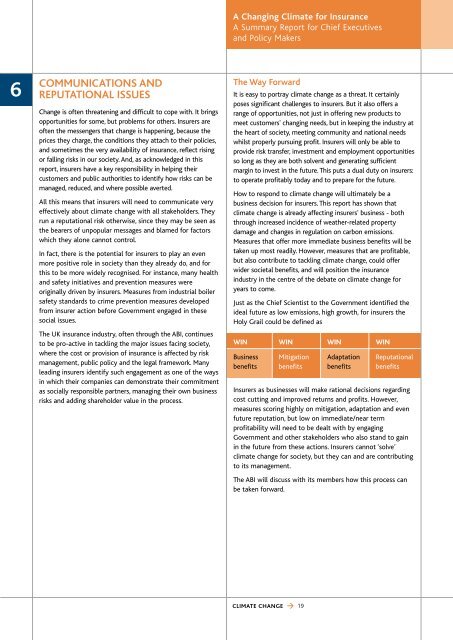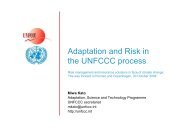9146 Depolarisation_6 - Munich Climate-Insurance Initiative
9146 Depolarisation_6 - Munich Climate-Insurance Initiative
9146 Depolarisation_6 - Munich Climate-Insurance Initiative
Create successful ePaper yourself
Turn your PDF publications into a flip-book with our unique Google optimized e-Paper software.
A Changing <strong>Climate</strong> for <strong>Insurance</strong><br />
A Summary Report for Chief Executives<br />
and Policy Makers<br />
6<br />
COMMUNICATIONS AND<br />
REPUTATIONAL ISSUES<br />
Change is often threatening and difficult to cope with. It brings<br />
opportunities for some, but problems for others. Insurers are<br />
often the messengers that change is happening, because the<br />
prices they charge, the conditions they attach to their policies,<br />
and sometimes the very availability of insurance, reflect rising<br />
or falling risks in our society. And, as acknowledged in this<br />
report, insurers have a key responsibility in helping their<br />
customers and public authorities to identify how risks can be<br />
managed, reduced, and where possible averted.<br />
All this means that insurers will need to communicate very<br />
effectively about climate change with all stakeholders. They<br />
run a reputational risk otherwise, since they may be seen as<br />
the bearers of unpopular messages and blamed for factors<br />
which they alone cannot control.<br />
In fact, there is the potential for insurers to play an even<br />
more positive role in society than they already do, and for<br />
this to be more widely recognised. For instance, many health<br />
and safety initiatives and prevention measures were<br />
originally driven by insurers. Measures from industrial boiler<br />
safety standards to crime prevention measures developed<br />
from insurer action before Government engaged in these<br />
social issues.<br />
The UK insurance industry, often through the ABI, continues<br />
to be pro-active in tackling the major issues facing society,<br />
where the cost or provision of insurance is affected by risk<br />
management, public policy and the legal framework. Many<br />
leading insurers identify such engagement as one of the ways<br />
in which their companies can demonstrate their commitment<br />
as socially responsible partners, managing their own business<br />
risks and adding shareholder value in the process.<br />
The Way Forward<br />
It is easy to portray climate change as a threat. It certainly<br />
poses significant challenges to insurers. But it also offers a<br />
range of opportunities, not just in offering new products to<br />
meet customers' changing needs, but in keeping the industry at<br />
the heart of society, meeting community and national needs<br />
whilst properly pursuing profit. Insurers will only be able to<br />
provide risk transfer, investment and employment opportunities<br />
so long as they are both solvent and generating sufficient<br />
margin to invest in the future. This puts a dual duty on insurers:<br />
to operate profitably today and to prepare for the future.<br />
How to respond to climate change will ultimately be a<br />
business decision for insurers. This report has shown that<br />
climate change is already affecting insurers' business - both<br />
through increased incidence of weather-related property<br />
damage and changes in regulation on carbon emissions.<br />
Measures that offer more immediate business benefits will be<br />
taken up most readily. However, measures that are profitable,<br />
but also contribute to tackling climate change, could offer<br />
wider societal benefits, and will position the insurance<br />
industry in the centre of the debate on climate change for<br />
years to come.<br />
Just as the Chief Scientist to the Government identified the<br />
ideal future as low emissions, high growth, for insurers the<br />
Holy Grail could be defined as<br />
WIN WIN WIN WIN<br />
Business Mitigation Adaptation Reputational<br />
benefits benefits benefits benefits<br />
Insurers as businesses will make rational decisions regarding<br />
cost cutting and improved returns and profits. However,<br />
measures scoring highly on mitigation, adaptation and even<br />
future reputation, but low on immediate/near term<br />
profitability will need to be dealt with by engaging<br />
Government and other stakeholders who also stand to gain<br />
in the future from these actions. Insurers cannot ‘solve’<br />
climate change for society, but they can and are contributing<br />
to its management.<br />
The ABI will discuss with its members how this process can<br />
be taken forward.<br />
CLIMATE CHANGE 19



